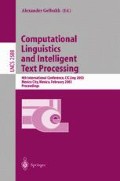Abstract
Sentences with V+Adj format (VA-statements) have the same syntax structure, whereas their semantic structures are always different owing to the semantic pointer of the adjective of V+Adj. In this paper we separate the verb and the adjective and start from the semantics of a VA-statement. The VAstatement can be decomposed into two statements, one formed from the verb (V-statement), and the other formed from the adjective (A-statement). We also point out the difference between the V-statement and A-statement and present a formal semantic representation using a fine-grained analysis of propositions in situation semantics. Then we propose that the verb and the adjective of V+Adj correspond to two kinds of predicates - relation and type, and give a formal model of the semantic pointer. An automatic analysis of the meaning of VAstatement is also presented. During the analysis, ambiguities that exist in VAstatements can be distinguished.
Access this chapter
Tax calculation will be finalised at checkout
Purchases are for personal use only
Preview
Unable to display preview. Download preview PDF.
References
Peter Ke: Questions in Chinese Grammatical system. Proceeding of the 3rd International Conference on Chinese Linguistics. Beijing Language and Culture University Press (1990)
Qingzhu Ma and Hongqi Wang: Reflection on the some grammatical questions. Proceeding of the 1st International Conference on Chinese Linguistics (1998)
Wangxi Zhang: Research on the Semantics of Chinese Special Syntax. Beijing Language and Culture University Press (1998)
Wenhua Lü: Verb Complement System. World Chinese Teaching No. 3 Vol. 57. (2001)
Shuxiang Lü: Semantic Relation of Verb Complement Sentence. The collection of Chinese Grammatical Papers. Commerce Press (1984)
Jianming Lu: About the Semantic Pointer Analysis. Modern Linguistics No. 1. (1996)
Jiangsheng Yu: A Formal Model of Semantic Pointer. Natural Language Understanding and Machine Translation. Ed. Changning Huang and Pu Zhang. Tsinghua University Press (2001)
Zongming Chen: Chinese Logic Theory. People Press (1993)
Brentano, Franz: Psychology from an Empirical Standpoint. Translated by Antos C. Rancurello, D. B. Terrell, and Linda L. Mcalister, Psychologie vom empirischen Standpunkt (1874) (1973)
Barwise Jon, and John Perry: Situation and Attitudes. Cambridge, MA: Mit press (1983)
Kuroda, S.-Y.: Japanese Syntax and Semantics. Dordrecht: Kluwer (1992)
Sasse, Hans Jurgen: The Thetic/Categorical Distinction Revisited. Linguistics Vol. 25. (1987) 511–580.
Ladusaw, William: Thetic and Categorical, Stage and Individual, Weak and Strong. In Proceedings of SALT IV, 220–229. Ithaca, NY. Cornell University (1994)
McNally, Louise: Stativity and Theticity. In proceedings of Bar-Ilan Conference on Event and Grammar (1995)
Schmerling, Susan F.: Aspects of English Sentence Stress. Austin: University of Texas Press (1976)
Kim, Yookyung: Information Articulation and Truth Conditions of Existential Sentences. Language and Information 1.1. (1998)
Barwise, Jon, and John Etchemendy: The Liar: An Essay on Truth and Circularity. New York: Oxford University Press (1987)
Barwise Jon, and Robin Cooper: Extended Kamp Notation: A Graphical Notation for Situation Theory. In Situation Theory and its Application, ed. P. Aczel, D. Israel, Y. Katagari, and S. Peters. 29–54. Stanford: CSLI. (1993)
Kamp, Hans and Uwe Relye: From Discourse to Logic. Dordrecht: Kluwer (1993)
Glasbey Sheila: Bare Plurals, Situation and Discourse Content Logic, language and computation. Vol. 2, edited by Lawrence S. Moss, Jonathan Ginzburg and Maarten de Rijke. CSLI publications (1999)
Carlson, Gregory N.: Reference to Kinds in English. Bloomington: Indiana University Linguistics Club (1977)
Jianming Lu: Complexity of Verb Complement Structure. Language Teaching and Study No. 1. (1990)
Keith Devlin: Logic and Information. Cambridge University Press (1991)
Author information
Authors and Affiliations
Editor information
Editors and Affiliations
Rights and permissions
Copyright information
© 2003 Springer-Verlag Berlin Heidelberg
About this paper
Cite this paper
Mao, Jj., Chen, Ql., Lu, Rz. (2003). Analyzing V+Adj in Situation Semantics. In: Gelbukh, A. (eds) Computational Linguistics and Intelligent Text Processing. CICLing 2003. Lecture Notes in Computer Science, vol 2588. Springer, Berlin, Heidelberg. https://doi.org/10.1007/3-540-36456-0_8
Download citation
DOI: https://doi.org/10.1007/3-540-36456-0_8
Published:
Publisher Name: Springer, Berlin, Heidelberg
Print ISBN: 978-3-540-00532-2
Online ISBN: 978-3-540-36456-6
eBook Packages: Springer Book Archive

